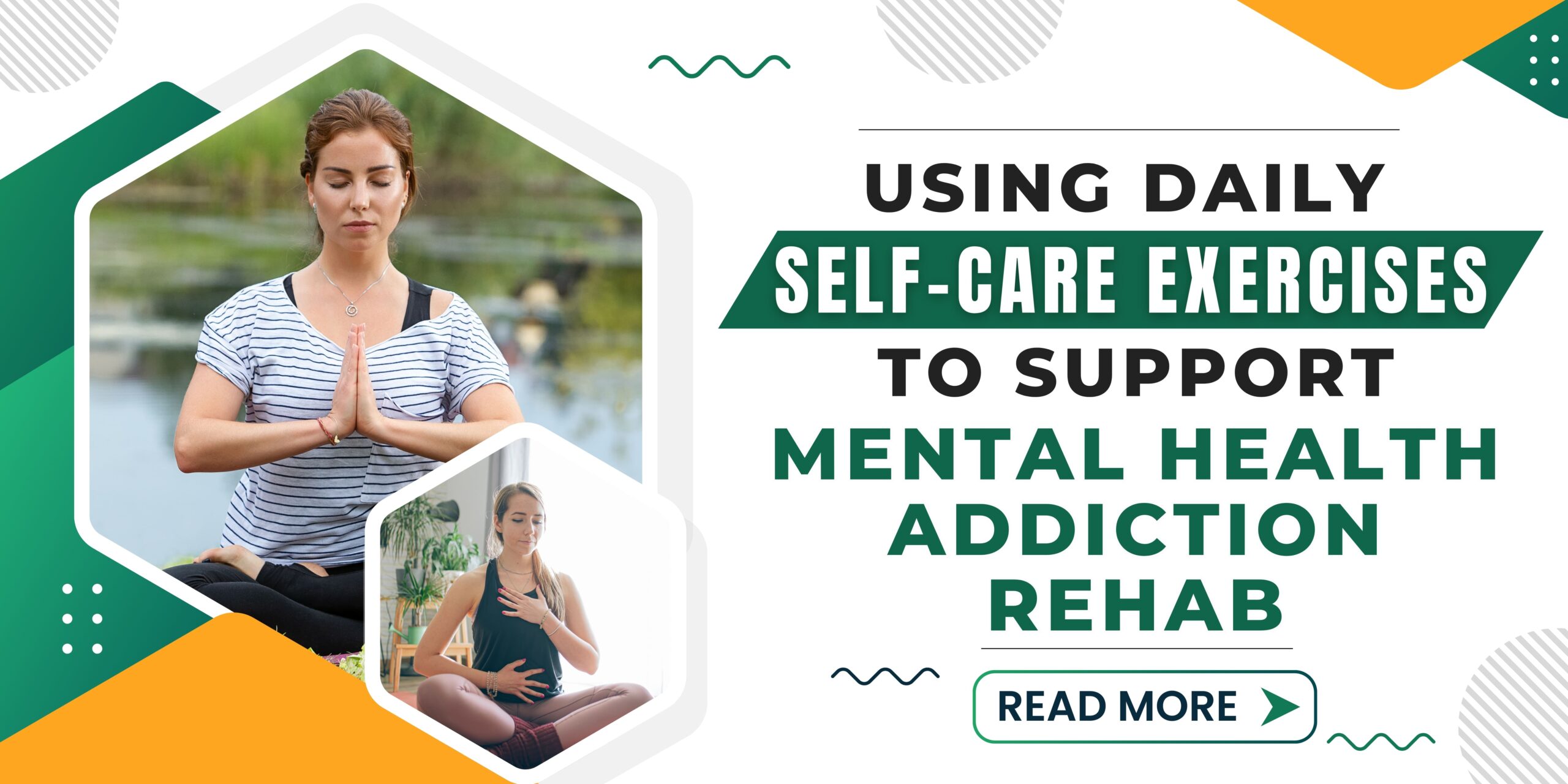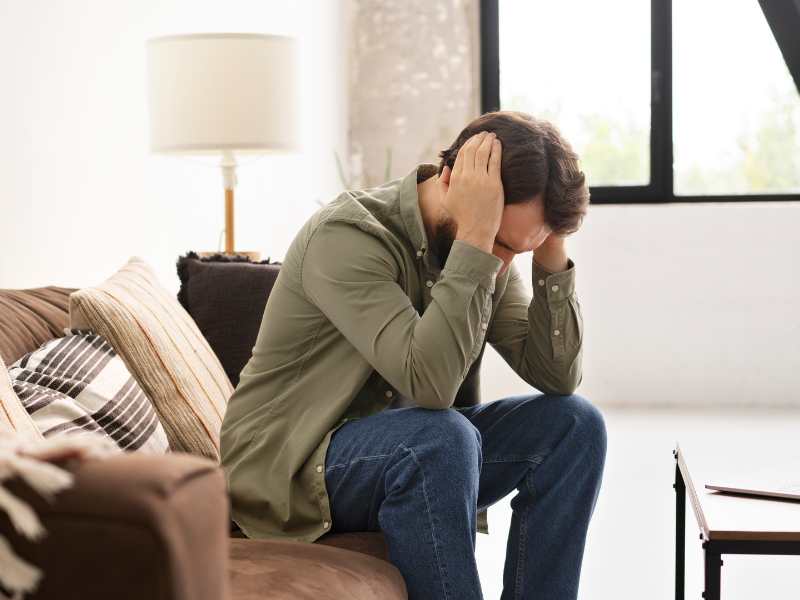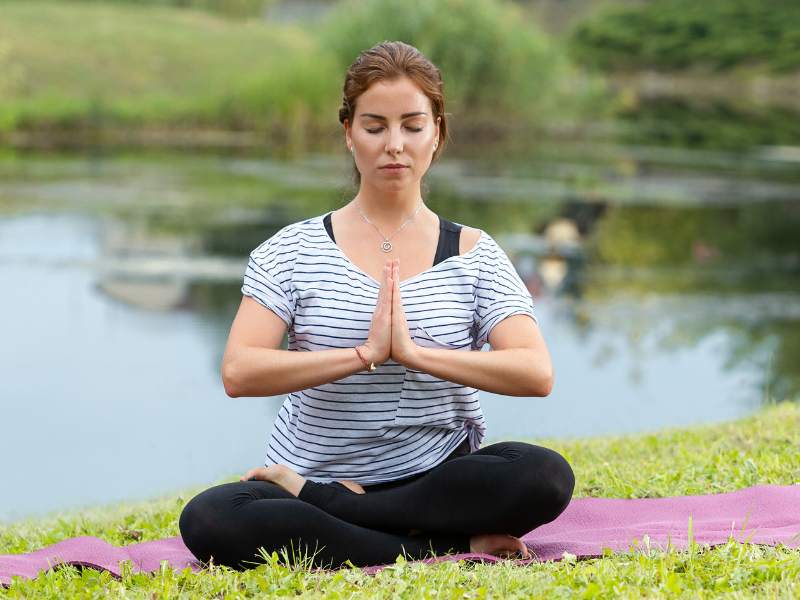Using Daily Self-Care Exercises to Support Mental Health Addiction Rehab


Mental health addiction can be debilitating. It is a state of severe psychological as well as physical dependence on certain substances. It calls for treatment depending on the severity of your condition. Self-care is a very important element in the journey of mental health addiction rehabilitation. It encompasses different activities as well as practices that individuals can partake in regularly to minimize stress as well as enhance overall well-being during the process of recovery. Daily self-care exercises can play a huge role in bolstering mental health during mental health addiction treatment.

Daily self-care exercises are essential tools in mental health addiction rehabilitation. They provide individuals with strategies that they can use to tackle stress, support mental health, and minimize the risk of relapse. When mindfulness, physical exercise, healthy nutrition, proper sleep, and medications work in tandem an individual can find his/her way out of addiction. Establishing meaningful social connections also forms part of self-care. Without self-care, no treatment for mental health addiction can be effective. Check the treatment offered by a mental health addiction treatment center to promote the recovery journey of a person.
The first course of action in treating mental health addiction typically involves professional intervention, including therapy and possibly medication, to address the underlying issues and symptoms. Therapy options such as cognitive-behavioral therapy (CBT) and counseling provide structured support and strategies for coping with addiction triggers and mental health challenges. Alongside professional treatment, self-care techniques play a crucial supportive role. They support recovery and overall well-being.
Mindfulness and meditation aid in stress management. Then regular physical exercise also has a very big hand in treating mental health addiction. It boosts mood and overall energy levels. Maintaining a balanced diet and consistent sleep schedule supports physical health and resilience. Setting achievable goals and practicing relaxation techniques further promote mental stability and reinforce the recovery process, making self-care an integral component of comprehensive addiction treatment.
When you call our helpline, an admissions navigator is there to listen to you, answer any questions you have, and provide the support that you need—all 100% confidentially.
Supporting mental health during mental health addiction recovery involves various self-care strategies designed to boost well-being as well as resilience. Mindfulness and meditation practices can help an individual stay in the present and manage stress effectively. Then there is physical exercise which is beneficial for both physical and mental health, enhancing mood and reducing anxiety. A person battling addiction should consume a balanced diet and maintain proper hydration levels. Apart from this, an individual is also encouraged to be involved in different creative activities like art, music, or journaling. These offer therapeutic outlets for emotions and stress. Additionally, it is important to set realistic goals and incorporate relaxation techniques, such as deep breathing exercises or progressive muscle relaxation, as these can further bolster mental health and aid in the recovery journey.
These self-care strategies for mental health addiction recovery have been explained in detail below:

Practicing mindfulness as well as meditation helps people with addiction stay in the present. They both reduce anxiety and stress, which are common triggers for relapse. Meditation and mindfulness are important self-care techniques that are used in mental health addiction treatment. With deep breathing, both mind and body reach a state of calm and ease. This is an important strategy to battle mental health addiction. Another technique that can be followed is guided meditation. This can be done via apps or recordings. Engaging in activities such as mindful eating and mindful walking goes a long way in tackling addiction.
Along with mindfulness, proper nutrition is also needed. It supports overall health and can improve mood and energy levels. In a treatment center, an individual consumes a variety of fruits, vegetables, lean proteins, and whole grains. Proper hydration is maintained so that blood sugar levels stay stable. All this is extremely helpful during addiction recovery.
There is no denying the fact that regular physical provides well-established benefits. It not only improves mood and trims down stress, but it is also extremely advantageous for those in mental health addiction recovery. Activities such as walking, swimming, or running help build up mental and physical tenacity and strength. Yoga involves trying different physical postures, meditation, and doing varied breathing exercises. All these take forward your journey of mental health addiction treatment.
Adequate sleep is essential for mental health and recovery. It is important to go to bed and wake up at the same time each day. Efforts should be made to create a comfortable and quiet sleep environment. Screen exposure before bedtime should be reduced drastically.
Fixing and then attaining small, manageable goals for yourself boosts self-esteem and provides a sense of victory. This is a part of self-care and will take you further on the journey of recovery. Mental health addiction treatment involves setting SMART goals. It refers to setting goals that are specific, measurable, achievable, relevant, and time-bound. An individual has to write daily tasks and goals and stick to them.
Another significant self-care technique for addiction recovery is making social connections. Building and maintaining healthy relationships is vital for emotional support. Ways to foster connections include:

We’ll instantly check the coverage offered by your insurance provider.
Incorporating relaxation exercises can help trim down stress and lead to mental well-being. At a mental health addiction treatment center, different relaxation techniques are used to promote convalescence. Some of the techniques used are mentioned below:
In conclusion, addressing mental health addiction requires a multifaceted approach that combines professional treatment with effective self-care techniques. Initial professional interventions, such as therapy and medication, no doubt offer the baseline treatment for managing addiction and mental health issues but incorporating self-care strategies enhances overall well-being and even leads to long-term recovery. Mindfulness, regular exercise, a balanced diet, consistent sleep, creative expression, and strong social connections all play pivotal roles in this holistic approach. By integrating these self-care practices into daily life, individuals can strengthen their resilience, and foster a healthier, more balanced lifestyle. Ultimately, the synergy between professional treatment and self-care is essential for achieving and maintaining mental health recovery. Log on to Gorehabs website and check out the suitable treatment options available to you.